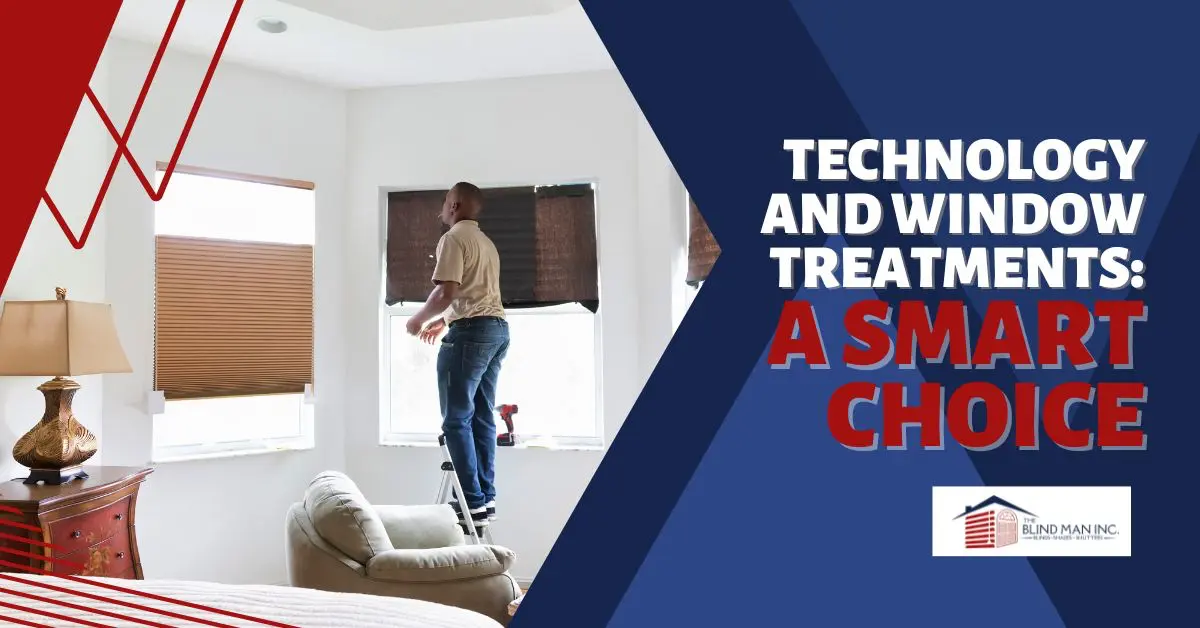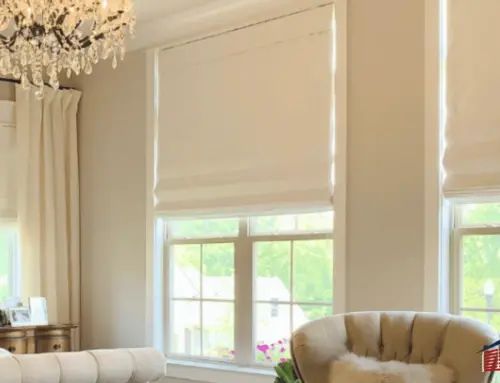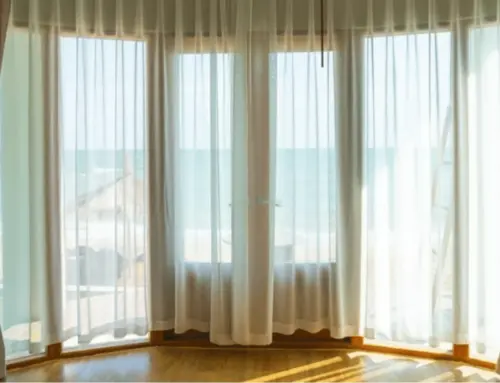In today’s tech-savvy world, smart window treatments offer homeowners a smart choice for enhancing convenience, energy efficiency, and privacy. These innovative solutions use technology to allow remote control, automated scheduling, and even voice commands, making them a versatile addition to modern homes.
With potential energy savings, improved security, and a sleek aesthetic, smart window treatments provide a practical and stylish way to elevate your living spaces in the digital age.
How do smart window treatments work?
Smart window treatments, or motorized blinds or shades, utilize technology to enhance their functionality. Here’s how they work:
 Motorization: Smart blinds and shades are equipped with electric motors that control the window coverings’ raising, lowering, or tilting. These motors are typically operated via remote control, smartphone apps, voice commands, or automation systems.
Motorization: Smart blinds and shades are equipped with electric motors that control the window coverings’ raising, lowering, or tilting. These motors are typically operated via remote control, smartphone apps, voice commands, or automation systems.- Remote Control: Homeowners can use a remote control device to manually adjust their smart window treatments. This allows for convenient and precise control over the position and angle of the blinds or shades.
- Smartphone Apps: Many smart window treatment systems offer dedicated smartphone apps enabling users to control their blinds or shades remotely. These apps may include scheduling features, allowing users to set specific times for opening and closing.
- Voice Commands: Integration with voice-activated assistants like Amazon Alexa or Google Assistant enables users to control their window treatments using voice commands, providing hands-free convenience.
- Automation: Smart window treatments can be integrated into home automation systems. They can be programmed to respond to various triggers, such as time of day, sunlight intensity, or temperature changes. For example, they can automatically close in order to decrease the amount of heat that is absorbed by the sun during the day.
- Solar Sensors: Some advanced systems include solar sensors that detect the amount of sunlight entering a room. When daylight exceeds a certain threshold, the blinds or shades adjust to block or filter the light accordingly.
Are there benefits to tech-based blinds?
Smart window treatments offer several notable benefits to homeowners:
- Convenience: The ability to control window treatments remotely or through voice commands adds comfort to daily life. Adjustments can be made without leaving your seat or home.
- Energy Efficiency: Smart blinds and shades can contribute to energy efficiency by optimizing natural light. They can be programmed to open during cold winter days to let in sunlight for passive heating and close during hot summer afternoons to reduce cooling costs.
- Privacy: With precise control over the angle and position of blinds or shades, homeowners can achieve the ideal degree of seclusion while permitting the flow of natural light into their spaces.
- Security: When homeowners are away, they can program their smart window treatments to open and close at specific times, creating the appearance of an occupied home and enhancing security.
- UV Protection: Smart window treatments can help protect furniture, flooring, and artwork from harmful UV rays by automatically adjusting to block direct sunlight.
- Improved Sleep: Blackout smart shades can create complete darkness in bedrooms, promoting better sleep by blocking out external light sources.
- Accessibility: Individuals with mobility issues can benefit from the ease of controlling window treatments with remote devices or voice commands.
- Aesthetics: Smart window treatments can enhance the overall look of a room by eliminating the need for cords or chains, creating a sleek and modern appearance.
Can smart blinds save on energy costs?
Yes, smart blinds have the potential to save on energy costs by optimizing the use of natural light and regulating indoor temperatures. Here’s how they contribute to energy efficiency:
- Natural Light Management: Smart blinds can be programmed to adjust throughout the day based on the sun’s position and intensity. They can open during daylight hours so that more light can enter and less artificial light can be used.
- Heat Gain Control: During hot summer months, smart blinds can automatically close during peak sunlight hours, cutting down on solar heat gain and the necessity of air conditioning. In the winter, they can open to take advantage of passive solar heating.
- Insulation: Some smart blinds have insulating properties that help maintain indoor temperatures. When closed, they create an additional layer of insulates, lowering the temperature drop in the winter and the rise in the summer.
- Custom Scheduling: Homeowners can create customized schedules for their smart blinds to align with their daily routines and seasonal changes, optimizing energy efficiency.
While the exact energy savings will vary depending on factors like the climate, the type of smart blinds, and the specific programming, homeowners can see a reduction in their heating and cooling costs over time.
What’s the cost of installing tech window treatments?
The cost of installing smart window treatments varies depending on several factors, including the type of window treatment, the brand, the level of automation, and whether professional installation is required. Here’s a breakdown of potential costs:
 Product Cost: The cost of the smart blinds or shades themselves can depend on parameters such as material, brand, and features, windows can cost anywhere from a few hundred to several thousand dollars.
Product Cost: The cost of the smart blinds or shades themselves can depend on parameters such as material, brand, and features, windows can cost anywhere from a few hundred to several thousand dollars.- Installation: DIY installation may be an option for some homeowners, reducing labor costs. However, professional installation is recommended for more complex systems and can range from $100 to $300 per window.
- Automation Hub: If the smart blinds require a central automation hub or control system, there may be an additional cost of $100 to $500.
- Solar Sensors: Advanced systems with solar sensors may cost extra, typically around $50 to $150 per sensor.
- Voice Assistant Integration: Integrating smart blinds with voice-activated assistants may require compatible devices, such as smart speakers or hubs, ranging from $30 to $150.
- Additional Features: Some smart blinds offer other features like noise reduction or UV protection, which may affect the overall cost.
- Operating System: The choice of the operating system (e.g., Bluetooth, Wi-Fi, Zigbee) may also impact costs.
Homeowners must consider their budget and specific needs when choosing smart window treatments. While upfront costs are involved, the long-term benefits of convenience, energy savings, and improved living spaces can make them a worthwhile investment.
Are there privacy concerns with smart shades?
Privacy concerns with smart shades primarily revolve around the possibility that cybercriminals could compromise the automation system. To address these concerns, it’s important to take the following precautions:
 Secure Wi-Fi Network: Ensure that your home Wi-Fi network is secure by using strong, unique passwords and enabling encryption. Regularly update your router’s firmware to protect against vulnerabilities.
Secure Wi-Fi Network: Ensure that your home Wi-Fi network is secure by using strong, unique passwords and enabling encryption. Regularly update your router’s firmware to protect against vulnerabilities.- Firmware Updates: Keep the firmware of your smart window treatment system up to date. Manufacturers may release updates to address security vulnerabilities.
- Authentication: Use two-factor authentication for your smart home devices and apps whenever possible to add an extra layer of security.
- Network Segmentation: Consider creating to protect your smart home gadgets from potential hackers, set them up on their own network and disconnect them from your main network to sensitive data.
- Privacy Settings: Review the privacy settings and permissions associated with the smartphone app or automation platform to control your smart shades. Limit access to necessary features and data.
- Regular Monitoring: Regularly monitor the activity of your smart window treatment system and check for any suspicious or unauthorized access.
By taking these precautions, homeowners can mitigate privacy concerns associated with smart shades and enjoy the benefits of enhanced convenience and energy efficiency without compromising security.
Smart window treatments represent a technological advancement that offers homeowners a range of benefits, from convenience and energy savings to improved privacy and security.
Understanding how smart window treatments work, their potential for energy efficiency, installation costs, and addressing privacy concerns can help homeowners make informed decisions when considering this smart home upgrade. Integrating technology with window treatments is a smart choice for those looking to enhance their living spaces in the digital age.
At The Blind Man, we are dedicated to helping homeowners make informed decisions about their window treatments, including the adoption of smart solutions. With the benefits of convenience, energy efficiency, and enhanced privacy in mind, our goal is to assist you in selecting and installing the perfect smart window treatments that align with your lifestyle and needs.





